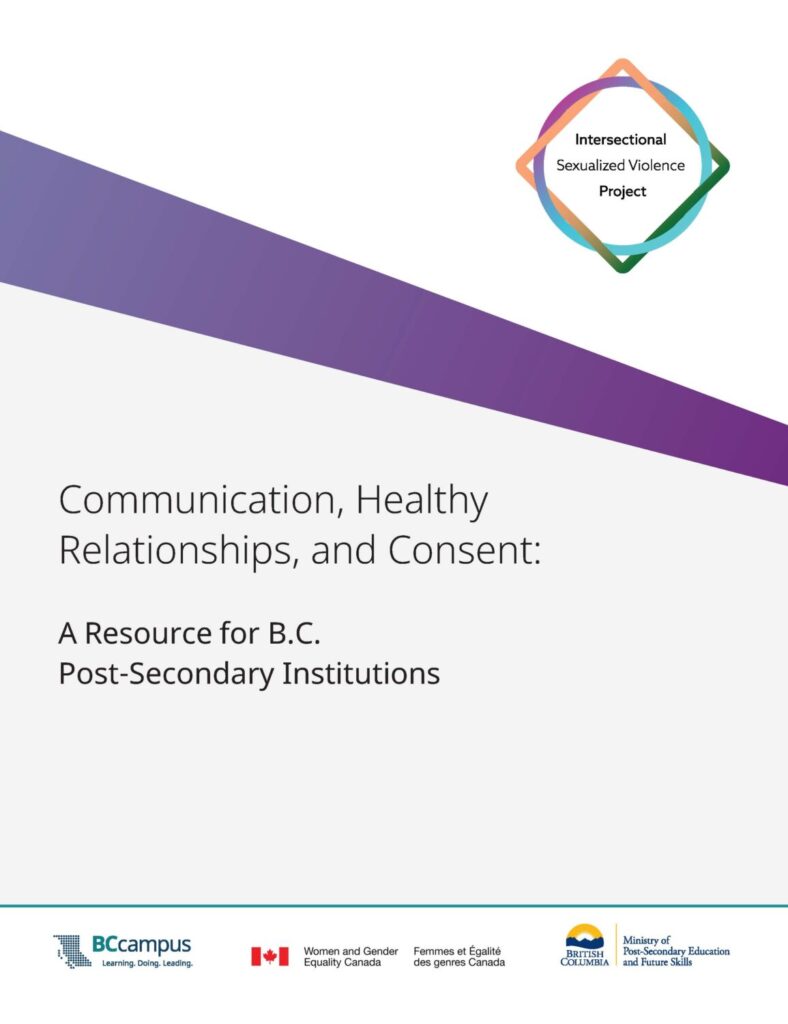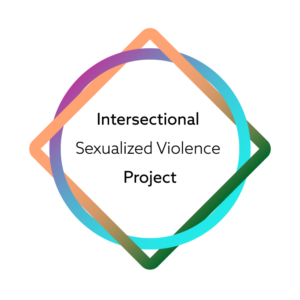By Catherina Blair, MA candidate in social justice education, Ontario Institute for Studies in Education at the University of Toronto and Samantha Matute Arrieta, program lead of communications, Ending Violence Association of BC
Curriculum Overview

Sexualized violence is an issue all post-secondary institutions grapple with. To support them, BCcampus worked closely with staff, faculty, administrators, students, and subject matter experts across B.C. to develop open education resources addressing intersectional sexualized violence at post-secondary institutions. Communication, Healthy Relationships, and Consent: A Resource for B.C. Post-Secondary Institutions was developed as part of the BCcampus Intersectional Sexualized Violence Project and funded by Women and Gender Equality (WAGE) in partnership with the Ministry of Post-Secondary Education and Future Skills.
Recognizing a gap in educational programming for international students, a dedicated team of curriculum writers, instructional designers, technical supports, a project manager, post-secondary institutions/organizations, the Ministry of Post-Secondary Education and Future Skills, and the Intersectional Sexualized Violence Advisory Group embarked on this journey and developed Communication, Healthy Relationships, and Consent. The team designed an interactive, self-paced, online curriculum for post-secondary institutions in British Columbia to implement. This resource aims to fill the educational gap and support institutions in addressing the unique needs of international students.
The curriculum was inspired by InterroBang, a card game created at Simon Fraser University (SFU), to answer the question: “How might we better support students from international pathways to learn about relationships and boundaries in an intercultural Canadian context?” In the game, students talk about relationships, communication, boundaries, consent, and identity in a fun and thought-provoking way.
We designed the curriculum with a strong focus on reflexivity, aiming to honour the knowledge, experiences, and strengths of international students while providing a supportive framework reflecting their unique challenges and opportunities. As curriculum writers, we define culture as not simply bound to geographical location or created by territorial boundaries, but as existing in spaces fostering shared ways of being. Examples of such cultural spaces include national culture, workplace culture, queer culture, campus culture, drinking culture, and more. Each of these cultural spaces influences how we relate to one another and how we understand concepts like communication, healthy relationships, and consent.
Curriculum background
As writers of a resource intended to address the gap in dedicated sexualized violence response/training for international students, we were committed to honouring students’ existing knowledge, experiences, and strengths. While the intended audience for this resource was international students, we believe the curriculum provides foundational learning for consent awareness and preventing sexualized violence, and recommend making it available to a wider audience.
Curriculum Content
Module 1: Understanding and communicating our boundaries
This module explores one’s upbringing and how people understand and communicate about boundaries across all their relationships. This module examines how various cultural contexts influence communication styles and play a role in building and maintaining safe and healthy relationships where boundaries are honoured and respected.
Module 2: Boundaries and healthy relationships
This module explores and reflects on the various qualities needed for maintaining safe and healthy relationships. This includes, but is not limited to, relationships with roommates or colleagues, friends, sexual or non-sexual partner(s), significant others, or a parent. By exploring and defining what these relationships mean to us, we can better understand the reasons behind the boundaries we have set.
Module 3: Talking about consent
This module explores the importance of communicating and navigating the complexities and nuances of consent. Our understandings and beliefs about sex and consent are shaped by our culture, gender expectations, lived experiences, and community influences. This module looks at how cultural contexts influence our understanding of consent and offers a range of examples, both verbal and non-verbal, of how consent can be given, received, and refused.
Each module includes a short video and reflection questions. We intentionally chose not to ask questions that have a right or wrong answer. Instead, we wanted to encourage participants to respond based on their own experiences and perspectives.
Resources
The curriculum is available in seven languages:
- Chinese Simplified: 沟通、健康关系与同意
- English: Communication, Healthy Relationships, and Consent
- Hindi: क यु नके शन, है द रलेशन श स, एंड कं स ट
- Portuguese: Comunicação, relacionamentos saudáveis e consentimento
- Punjabi: ਗੱ ਲਬਾਤ, ਿਸਹਤਮੰ ਦ ਸੰ ਬੰ ਧ, ਅਤੇ ਸਿਹਮਤੀ
- Spanish: Comunicación, relaciones sanas y consentimiento
- Vietnamese: Truyền Thông, Những Mối Liên Hệ Lành Mạnh, và Ưng Thuận
About the Curriculum Writers
Catherina Blair is a bilingual (French and English) Canadian woman who resides in the traditional and unceded territories of the Anishinabewaki, Wendake-Nionwentsïo, Haudenosaunee, Mississauga, and Mississaugas of the Credit First Nation. Catherina’s interest in participating in this project stemmed from acknowledging the importance of creating a resource for international students. Her aim was not to Westernize their perspectives, but to create a space to self-reflect and understand one’s positionality within the Canadian context. She is currently a MA candidate in social justice education at the Ontario Institute for Studies in Education at the University of Toronto specializing in sexual and gender-based violence prevention education in post-secondary institutions globally.
Samantha Matute Arrieta is a first-generation Venezuelan immigrant and settler in the traditional and unceded territories of the Musqueam, Squamish, and Tsleil-Waututh peoples. Having arrived as an international student, her work in this project is led by her hopes for international students to find belonging in their new contexts and maintain their agency in the process. Sam began her journey working in the settlement sector on a project to equip newcomers as they take part in social and civic engagement opportunities. She is now working at the Ending Violence Association of BC, supporting training and communications programs for the gender-based violence sector in B.C.

Webinar: Intersectional Sexualized Violence Project – New Resource Showcase
Join us for an engaging 90-minute webinar to learn about newly developed resources to help prevent and respond to sexualized violence at post-secondary institutions.
BCcampus collaborated with students, staff, and faculty, and a team of subject-matter experts in the B.C. post-secondary sector to develop these resources. The resources are intended to support graduate, international, and Indigenous students, and they provide foundational training on technology-facilitated sexualized violence. They were developed in partnership with the Ministry of Post-Secondary Education and Future Skills and funded by Women and Gender Equality Canada as part of the Intersectional Sexualized Violence Project.
